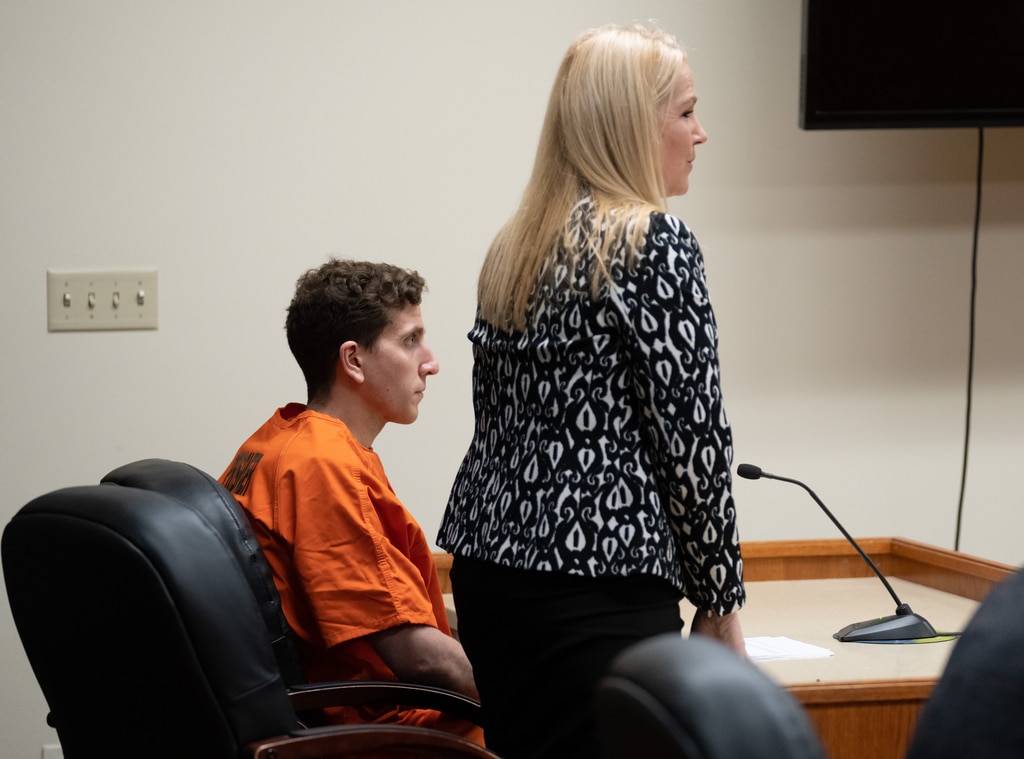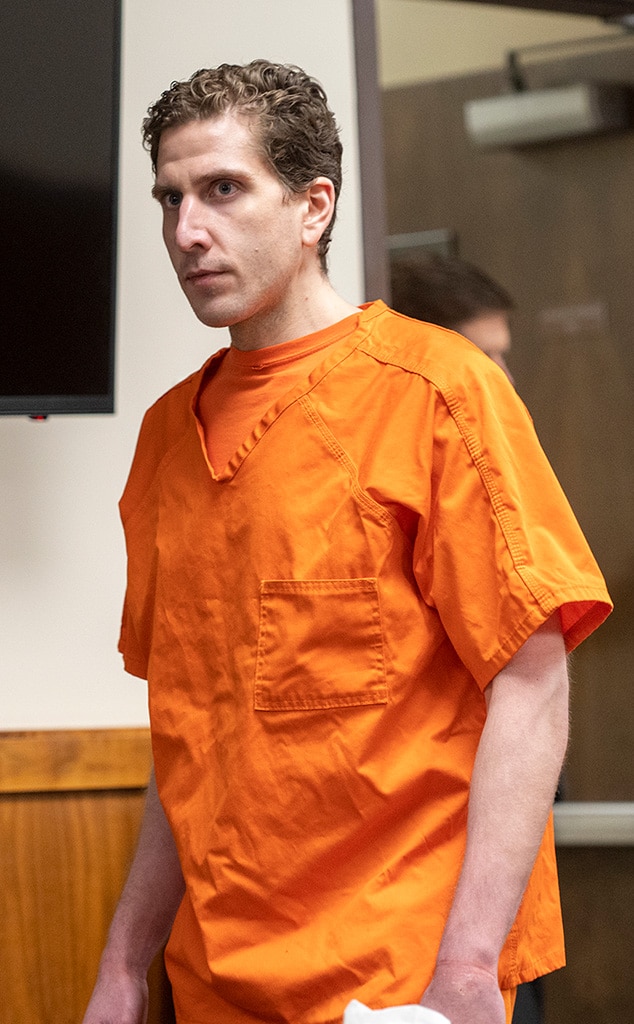
Bryan Kohberger’s legal team is preparing for his trial.
During a court hearing on the 9th of April, Kohberger’s legal team discussed factors that might sway the jury when his trial for the alleged murders of students Madison Mogen, Kaylee Goncalves, Xana Kernodle, and Ethan Chapin (for whom he has pleaded not guilty) commences in August.
At the trial, Judge Steven Hippler, as reported by NBC News, stated that terms like “sociopath” and “psychopath” should not be employed to label Kohberger in the courtroom, but he considered “murderer” an acceptable designation instead.
In their ongoing campaign to abolish the death penalty as a potential sentence, Brian Kohberger’s legal team has also emphasized his recent diagnosis of Autism Spectrum Disorder (ASD). They have previously suggested that this condition might affect jurors’ decisions due to Kohberger’s lack of facial expression and limited emotional responses.
At the court hearing, the defense for the 30-year-old individual elaborated on the potential effects of his diagnosed condition and the prospect of capital punishment should he be declared culpable.
According to NBC News, Mr. Kohberger’s legal team stated that due to his Autism Spectrum Disorder (ASD), he finds it challenging to behave in ways society considers typical. This difficulty raises significant concerns that he may face the death penalty not because of his guilt but because of his disability.
During the court proceedings, there was no ruling on the death penalty regarding Kohberger’s case. However, the prosecution has chosen not to use Kohberger’s autism diagnosis as a factor to strengthen their argument in favor of capital punishment, as reported by NBC News. In other words, they have decided not to present his autism as an aspect that could make the punishment more severe.

In a court document, prosecutors have pointed out that Kohberger’s autism diagnosis was mentioned earlier. They contend that his autism falls under the mildest category, without associated intellectual or communication impairments. Furthermore, they claim he has not demonstrated how this diagnosis lessens his accountability for murder in any way.
Previously, Kohberger’s legal team argued that his diagnosed condition might account for why he was seen wearing gloves and cleaning up during the night of his arrest in December 2022.
In simpler terms, Kohberger’s lawyer argues that the evidence presented does not necessarily prove guilt but rather could be explained by a common habit of Kohberger – wearing gloves to avoid germs. This argument was made in response to claims that the defendant was trying to hide his DNA or clean his car. The lawyer contends that this interpretation is biased and misleading.

Instead of washing my car the evening I was apprehended, as the prosecution suggests, I was, in fact, wide awake past my usual bedtime – a common occurrence for me – and I spent that time meticulously cleaning my bathroom.
Read on for more on the harrowing case before Kohberger’s trial begins.

The young individuals – Kaylee Goncalves (age 21), Madison Mogen (also 21), Xana Kernodle (aged 20), and Ethan Chapin’s girlfriend (and she was 20 as well) – were students at the University of Idaho. They resided in an apartment situated off campus.
On November 12, 2022, Goncalves, Mogen, Kernodle, and Chapin were in different locations before their bodies were discovered: The former two were at a sports bar nearby, while the latter two were attending Chapin’s fraternity party. By 2 a.m. on November 13, all four roommates and Chapin returned to their three-story rental house.
Goncalves, a senior studying general studies at the College of Arts and Humanities, was anticipated to graduate in December. Her friend, Jordyn Quesnell, shared that she was moving to Austin, Texas, for work at a marketing company after graduation, according to The New York Times.
During her marketing studies, Mogen had been close friends with Goncalves since the 6th grade. It was revealed by their family friend, Jessie Frost, to The Idaho Statesman that she intended to relocate to Boise following graduation.
At one point, Kernodle was a junior studying marketing, as stated. She and Chapin, who specialized in recreation, sport, and tourism management, had been together since the spring, according to their neighbor Ellie McKnight, as shared with NBC News.

Two residents, Dylan Mortensen and Bethany Funke, were at home when the murders occurred. Text messages that were made public on March 6, 2025, show that Mortensen and Funke attempted to reach their fellow roommates on November 13, after Mortensen claimed he saw a masked individual wandering around their house, as suggested by documents acquired by TopMob News.
“No one is answering,” Mortensen texted Funke at 4:22 a.m. “I’m rlly confused rn.”
She persistently contacted her roommates, encouraging them to reply. At 4:32 a.m., she messaged Goncalves, “Please respond,” and later again at 10:23 a.m., asking, “Are you awake?
11:58 a.m. saw a 911 call being made following the discovery of an unresponsive Kernodle, as revealed by a supplementary statement acquired by TopMob News. In the log, a woman identified as A1 detailed the present circumstances to the operator.
She mentioned over the phone, “One of our flatmates is still unconscious, apparently they had too much to drink last night, and they haven’t awakened yet.” Additionally, she informed that they spotted a stranger in their residence last night.

Bryan Kohberger, now facing four counts of first-degree murder charges, was a Ph.D. student at Washington State University. It wasn’t until more than a month after the bodies of Gonclaves, Mogen, Kernodle, and Chapin were found that Kohberger was apprehended on December 30 in Monroe County, Pennsylvania. He was transported to Idaho on January 4 for further legal proceedings.
It was through DNA evidence found on a discarded knife sheath at the crime scene that authorities linked him to the murders, as reported by NBC News in their June 2023 court documents.
As an overly-eager sleuth, I couldn’t help but follow every twist and turn in this captivating case. When the DNA didn’t yield a match within the FBI database, I held my breath, knowing that the answer might lie elsewhere. Authorities, sensing my anticipation, delved deeper by running the DNA through public ancestry websites, creating a list of potential suspects – a move that felt like they were unraveling a complex puzzle just for me.
Then, the breakthrough came when I learned that Kohberger had traveled to his parents’ residence in Monroe County. Local officials, sharing my excitement, combed through their trash and struck gold! They found DNA that matched the one discovered at the crime scene – a connection that undeniably tied Kohberger to this chilling mystery.
Each new development only fueled my obsession, driving me further into the heart of this riveting investigation. The thrill of the chase is almost unbearable, but I can’t look away – not when the truth is so tantalizingly within reach!

Currently, no clear reason behind the attack is disclosed, as a court order restricts those connected to the case from making public statements. Nevertheless, some details about their arguments have been revealed in the released documents. (NBC News reported this)
In a motion acquired by TopMob News, Kohberger’s legal team asked for the death penalty to be dismissed. If found guilty on all charges in November 2024, Kohberger could face capital punishment. However, they claim that he has Autism Spectrum Disorder (ASD), and executing someone with this condition would contradict the Eighth Amendment’s ban on “unusual and severe” penalties.
His defense contends that Kohbereger’s thought patterns are exceptionally inflexible, he tends to fixate on certain subjects, handles data in fragments rather than as a whole, finds it difficult to envision future scenarios, and shows minimal self-awareness regarding his actions and feelings.
In simpler terms, the statement suggests that due to Mr. Kohberger’s Autism Spectrum Disorder (ASD), he may struggle to behave in ways society considers typical. This could potentially lead to a miscarriage of justice, as he might face execution based on his disability rather than his actions and accountability for any crimes he may have committed.

At his court appearance in May 2023, a judge entered a not-guilty plea on behalf of Kohberger for the first-degree murder charges, as he chose to remain silent at the time. Initially scheduled for October 2, 2023, his trial was postponed after Kohberger voluntarily gave up his right to a speedy trial in August 2023.
The commencement of his upcoming trial, located in Ada County approximately 300 miles away from Latah County where the crimes occurred, has been scheduled for August 11, 2025.
In September 2024, Judge John Judge of Latah County granted Kohberger’s legal team’s petition for transfer due to potential bias if the trial continued in Latah County. On the other hand, Judge Steven Hippler of Ada County, who is now overseeing the case, rejected the defense’s motion to exclude crucial DNA evidence and other materials such as cell phone and email records, surveillance footage, past Amazon purchases, and DNA evidence from the trial.
Read More
- PI PREDICTION. PI cryptocurrency
- WCT PREDICTION. WCT cryptocurrency
- The Bachelor’s Ben Higgins and Jessica Clarke Welcome Baby Girl with Heartfelt Instagram Post
- Royal Baby Alert: Princess Beatrice Welcomes Second Child!
- SOL PREDICTION. SOL cryptocurrency
- Sea of Thieves Season 15: New Megalodons, Wildlife, and More!
- Sacha Baron Cohen and Isla Fisher’s Love Story: From Engagement to Divorce
- AMD’s RDNA 4 GPUs Reinvigorate the Mid-Range Market
- Upper Deck’s First DC Annual Trading Cards Are Finally Here
- Cynthia Erivo’s Grammys Ring: Engagement or Just Accessory?
2025-04-10 17:49